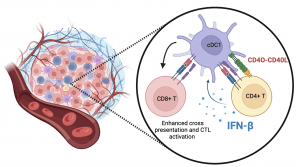Cancer immunotherapy relies on the activation of immune cells. One strategy has focused on the activation of CTLs (Cytotoxic T cell lymphocytes), which are required for the optimized elimination of the tumor. For this to happen, many signals and cells are required for the proper acquisition of a cytotoxic program, including those provided by CD4+ T cells, a process called CD4+ T cell help.
Early studies have demonstrated that CD4+ T cell help is necessary to enhance clonal expansion and promote effector differentiation. In mice and humans, the underlying mechanisms of this process are thought to occur by CD40 ligand- CD40 signaling pathway in CD4+ T cell and cDC1s (Type 1 Dendritic Cells), respectively. However, scientists from Leiden University Medical Center have added an unexpected player to this help which is the IFN-β (Figure 1).

Figure 1: Within the TME CD4+ IFN-β producing T cells activate cDC1s which enhances antigen presentation capacities and cross-presentation to activate CTLS. Created with BioRender.com
Why is this cytokine important? Well, IFN-β produced by activated CD4+ T cells, signals cDC1s to activate and cross-present antigens to CTLs, which are responsible for eliminating the tumor. More strikingly, the authors demonstrated that both CD40 ligand and IFNβ are necessary for proper cDC1 licensing, each playing a unique role.
Most importantly, the authors showed using scRNAseq that this was all happening in the tumor microenvironment of human samples. Additionally, the presence of this population was associated with a good prognosis and response to checkpoint inhibitors.
This article provides novel insights into the signals required for CTL activation within the tumor microenvironment. IFN-I signaling pathways hold promise for the development of innovative treatments that could revolutionize the field of cancer therapy.
Journal article: Lei, X., et al., 2024. CD4+ T cells produce IFN-I to license cDC1s for induction of cytotoxic T-cell activity in human tumors. Cellular & Molecular Immunology.
Summary by Eugenio Contreras Castillo










